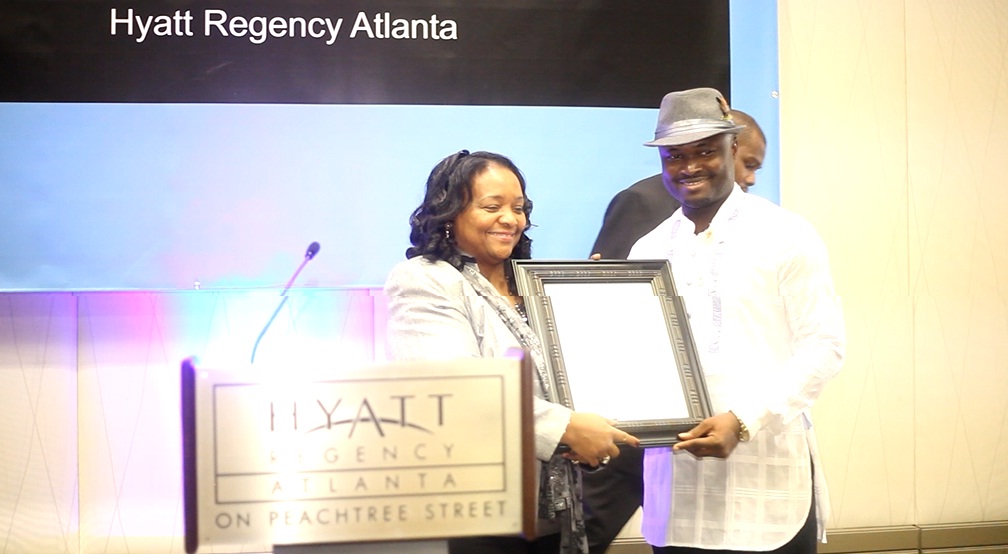 Over the years there has been a re-emergence of African motifs, prints and textiles onto the global stage. Fashion houses and designers such as Burberry and Vivian Westwood produced collections clearly influenced by the various cultures and landscapes found in Africa. Even the internationally most recognisable First Lady, Michelle Obama, was spotted and photographed on numerous occasions sporting the African-influenced designs of Nigerian designer Duro Oluwa. Several publications took notice of the frenzy surrounding African influences in the fashion industry. Influential Vogue Magazine (US edition) in its Special Edition Best Dressed: Vogue’s Rising Style Stars of 2011 featured not one, but two African women known for their fondness of African inspired wear: Ethiopian Julia Sarr-Jamois, fashion editor of The Wonderland Magazine and Nigerian Oroma Elewa, editor of Pop Africana Magazine.
Over the years there has been a re-emergence of African motifs, prints and textiles onto the global stage. Fashion houses and designers such as Burberry and Vivian Westwood produced collections clearly influenced by the various cultures and landscapes found in Africa. Even the internationally most recognisable First Lady, Michelle Obama, was spotted and photographed on numerous occasions sporting the African-influenced designs of Nigerian designer Duro Oluwa. Several publications took notice of the frenzy surrounding African influences in the fashion industry. Influential Vogue Magazine (US edition) in its Special Edition Best Dressed: Vogue’s Rising Style Stars of 2011 featured not one, but two African women known for their fondness of African inspired wear: Ethiopian Julia Sarr-Jamois, fashion editor of The Wonderland Magazine and Nigerian Oroma Elewa, editor of Pop Africana Magazine.
Arise Magazine editor Helen Jennings has been applauded for her book New African Fashion. Since her tenure as editor at Arise Magazine, Jennings has had the privilege of being exposed to many emerging African talents, African street style and trends that have been largely ignored by western media outlets. Due to her experience and influence in the African fashion industry, Jennings embarked upon a project to produce a visually spectacular and comprehensive guide to the African fashion industry, which explores why African fashion is truly shining now. Jennings’ book shows the savvy creativity of African designers, how they look beyond clichés of African aesthetics and the ‘new’, with deep love for Africa’s cultural and social consciousness.
African fashion entrepreneurs who are based in Africa are using regional and continental expos to showcase and sell their brands. In 2011 alone, sixteen major events throughout Africa provided African-based designers and entrepreneurs with platforms to showcase their designs. South Africa took the lead by hosting three fashion weeks, two in Cape Town and one in Johannesburg that involved designers from all over the continent. South Africa’s fashion week events have been highly publicised, but neighbouring countries Angola, Mozambique and Zimbabwe hosted their own fashion week events in order to accommodate and encourage the local talent and industry.
The East African fashion industry’s annual highlight is the Swahili Fashion Week, an event described as “a fast growing platform for fashion and accessory designers from Swahili speaking countries and the African continent to showcase their talent, market their creativity and network with clientele and international fashion industry.”Nigeria also hosted two major fashion events, Nigeria Fashion Week and MTN’s Lagos Fashion and Design Week. MTN, Africa’s leading telecommunication company, collaborated with the fashion industry in Lagos to host this event, which brought together media agencies, industry agents, buyers and consumers to view the current collections of designers in Lagos.
In addition to the hum on the continent, African-inspired fashion and designers caused great excitement in New York City, considered to be one of the world’s fashion capitals. The five selected designers chosen to represent African talent at the New York showcase were Nigerian designers Lanre DaSilva-Ajayi, Tsemaye Binitie, duo Bunmi Olaye and Francis Udom of Bunmi Koko, Fati Asibelua and South African duo Malcolm Kluk and Christiaan Gabriel Du Toit of KLUK CGDT, all of whom received rave reviews from critics for their debuts in New York City.
Fashion events staged in various countries were not the only platform for African-based fashion designers and entrepreneurs to showcase their talents in 2011. The internet is becoming a solid promotion tool for African fashion, with Nigerian and South African fashion industry orientated websites definitely taking the lead.
Social media sites like Facebook and Tumblr also prove popular mediums for African designers, artisans and brands based in various African countries, not only to promote their business but also as a means for interested consumers to enquire and buy.
Both established and aspiring African designers are reaping the rewards of a reinvigorated fashion industry in Africa. Smaller and traditional African accessories and textile artisans, commonly associated with curios sold at tourist markets in Africa, are finding their own niche in the industry by joining efforts with established companies in the west. These collaborations are termed ‘ethical fashion,’ a term used to describe “the design, production and retail and purchasing of items. It covers a range of issues such as pay and working conditions, fair trade, sustainable production, the environment and animal welfare.”
Similarly, ASOS.com, the largest online shopping retailer in the UK, collaborated with French designer, Jessica Ogden, in 2011 to create a Made in Africa collection. This collection is exclusively designed, sourced and purchased by artisan community groups in Kenya to support the work of SOKO, a workshop dedicated to developing sustainable solutions to economic challenges that Kenyan communities face. ASOS.com claims that the company will match every purchase made by customers to improve the SOKO workshop in Kenya by providing local Kenyan artisans with training and skills to improve their own artistry and businesses. SUNO, a New York based women’s wear brand founded by Max Osterweis and Erin Betty, launched their first collection in 2009 in Kenya. “Using vintage Kenyan textiles that Osterweis had been collecting for years” they produced their first small collection in Kenya.The company hopes to train and encourage artisans in the Kenyan fashion industry to create and own their own sustainable brands.
This year 2012 is already exciting and interesting for the African fashion industry. Numerous events had taken place, for example the Vauxhall Fashion Scout/Ubuntu International Project in London which provided promotion opportunities to African designers. The Hub of Africa Fashion Week 2012 in April Addis Ababa, Ethiopia. The objective of the event was promoted as being to “unite the industry through fashion by featuring designers and fashion industry players in Africa, as well as providing an open platform that promotes trade development and conscious environmental fashion that will create a new platform for a cleaner future and to promote sustainable development by encouraging young people who have a keen interest in fashion to make good use of their talents, which serves to build the fashion industry in Africa.
Franca Sozzani recently took an exploration mentoring tour of Africa to see for herself what the buzz about the so called “New African Fashion” was all about, so she can hopefully represent it properly and in its authentic full spectrum outside of European, American embellishment and aesthetic.
The African Fashion industry is indeed making strides in developing its own industry. Last month alone brought more growth, new initiatives and bountiful hope to the continent through the fashion industry.


